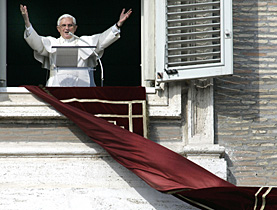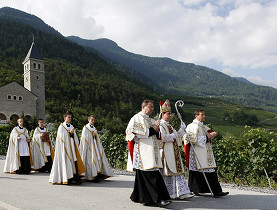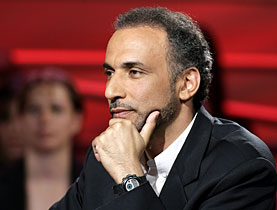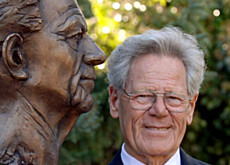“It’s up to the pope to apologise”

Swiss theologian Hans Küng has told swissinfo he believes the pope knew about the anti-Semitic views of the traditionalist bishops he pardoned last month.
Pope Benedict XVI officially rehabilitated four members of the Valais-based Society of St Pius X on January 24.
Among them was Richard Williamson, who has made statements denying the full extent of the Nazi Holocaust.
Küng also criticises the Vatican for following a more conservative line under Pope Benedict.
swissinfo: First Pope Benedict XVI lifted the excommunication of the four, and now he is asking Williamson to apologise for his statements. What do you read into this?
Hans Küng: The whole thing is a zigzag course and partly a red herring. It’s very clear that the pope has made a colossal mistake in welcoming back all four bishops who were against the Second Vatican Council – not only with respect to Judaism but also with respect to freedom of religion and conscience in general, accommodation with the Protestant churches, rapprochement with Islam and other world religions, as well as reform of the liturgy.
It all came to a head because one of these bishops had the audacity to virtually deny the Holocaust. It’s not enough for the bishop now to take back this shocking statement. It’s up to the pope to issue a personal apology and to rescind the pardon. We expect from the pope that he will not cosy up to people who represent the church as it was in the Middle Ages and the counter-reformation.
swissinfo: Do you really think that the pope was unaware that Richard Williamson had denied the extent of the Holocaust?
H.K.: It may be the case that he wasn’t informed of the Holocaust denial, but that’s no excuse. He certainly knew that the Pius Fraternity spread anti-Semitic sentiments.
swissinfo: What is your opinion of the intervention in Vatican policy by German Chancellor Angela Merkel?
H.K.: It’s a warning to the curia [papal court]. It shows that she finds herself struggling politically. As the German chancellor, she sees herself as a spokeswoman for millions of Catholics in Germany, as well as the country’s Jews and their organisations. And naturally she doesn’t want there to be any ambiguity that it’s a German pope who fails to understand Jews.
swissinfo: To what extent was Merkel’s criticism pivotal in convincing the pope to demand an apology from Williamson?
H.K.: It was certainly an influence. The curia doesn’t take theologians very seriously when they speak out against impractical rehabilitation policy, but it’s a different matter when a politician with her clout does.
swissinfo: Recently the pope made the archconservative priest Gerhard Maria Wagner auxiliary bishop of Linz. He was reported to have said the destruction of abortion clinics by Hurricane Katrina was divine retribution.
H.K.: Of course, [the pope] doesn’t always see the impact, but the entire policy has been consciously driven by the council. This appointment is a special case and it has caused a furore. But all of the bishops, as far as they are appointed by Rome, are mostly conservative or reactionary.
We are currently seeing a course of restoration. On the one hand, this is being achieved through a batch of reactionary documents and on the other through these appointments.
We can be happy in Switzerland and the bishopric of Basel that the bishop is elected by the representatives of the diocese and is only confirmed by Rome. But even in this case, Rome has tried repeatedly to use its influence to push through its preferred candidate.
swissinfo: Where else do you see signs the Vatican is becoming more conservative?
H.K.: All demands for reform are blocked. The system is unfortunately becoming more centralist. There is an urgent need for a change to the way bishops are chosen, as well as the pontiff.
It now looks as if the position of pope will always be held by a man of the system. Joseph Ratzinger was an exponent of this conservative line and he was chosen by conservative cardinals – contrary to all expectations.
swissinfo: The pope hasn’t only upset Jewish communities since his appointment. His lecture in Regensburg in 2006 [linking Islam with past violence] led to a wave of indignation in the Islamic world. Is the time past for interreligious dialogue?
H.K.: The pope has lived for decades in an isolated clerical world. He sees the world only from the perspective of the Vatican and can’t imagine the impact his words can have.
swissinfo: Are you saying that the pope has lost all sense of reality?
H.K.: The pope acts as if the tourists who crowd into St Peter’s square represent the church.
He doesn’t see that the large youth gatherings in Germany or Australia, for example, are not really representative of the young people of these countries.
And he doesn’t see that today thousands of parishes are without priests because he isn’t prepared to allow married men or women to enter the priesthood. These are impractical attitudes. Everything depends on one man.
swissinfo: What are the consequences of these Vatican policies for the world at large?
H.K.: The pope has lost an enormous amount of credibility. That can be seen in Germany where his appointment was enthusiastically received. The slogan “We are all the pope” has been overtaken by “We are the pope’s suffering”.
People in Germany fear that a shadow will be cast over the nation because a German pope has so little understanding for Jews and Muslims.
swissinfo-interview: Corinne Buchser
Hans Küng is a Catholic priest, theologian and author.
In 1960 he was appointed professor of theology at Eberhard Karls University in Tübingen, Germany, and helped recruit Josef Ratzinger, now Pope Benedict XVI, in 1966.
During the same period Küng served as an expert theological advisor to members of the Second Vatican Council until its conclusion in 1965.
In the late 1960s he became the first major Roman Catholic theologian since the late 19th century to reject the doctrine of papal infallibility. His position led him to be stripped of his authority to teach Catholic theology in 1979.
Though he had to leave the Catholic faculty, he remained at the university as a professor of Ecumenical Theology until his retirement in 1996. Since 1995 he has been president of the Global Ethic Foundation.
The four pardoned bishops were ordained in 1988 by the breakaway French Archbishop Marcel Lefebvre, of the Society of St Pius X. The ultra-conservative group was founded in 1970 by Lefebvre who rejected the reforms of the Second Vatican Council.
One of the bishops, Richard Williamson, has said publicly that the Nazi gas chambers did not exist, and that he believed 300,000 Jews died in concentration camps, instead of six million as is widely accepted.
The Vatican decree in pardoning the bishops spoke of overcoming the “scandal of divisiveness” and seeking reconciliation with Lefebvre’s conservative order.

In compliance with the JTI standards
More: SWI swissinfo.ch certified by the Journalism Trust Initiative



You can find an overview of ongoing debates with our journalists here. Please join us!
If you want to start a conversation about a topic raised in this article or want to report factual errors, email us at english@swissinfo.ch.